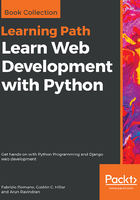
How do we use modules and packages?
When a developer is writing an application, it is likely that they will need to apply the same piece of logic in different parts of it. For example, when writing a parser for the data that comes from a form that a user can fill in a web page, the application will have to validate whether a certain field is holding a number or not. Regardless of how the logic for this kind of validation is written, it's likely that it will be needed in more than one place.
For example, in a poll application, where the user is asked many questions, it's likely that several of them will require a numeric answer. For example:
- What is your age?
- How many pets do you own?
- How many children do you have?
- How many times have you been married?
It would be very bad practice to copy/paste (or, more properly said: duplicate) the validation logic in every place where we expect a numeric answer. This would violate the don't repeat yourself (DRY) principle, which states that you should never repeat the same piece of code more than once in your application. I feel the need to stress the importance of this principle: you should never repeat the same piece of code more than once in your application (pun intended).
There are several reasons why repeating the same piece of logic can be very bad, the most important ones being:
- There could be a bug in the logic, and therefore, you would have to correct it in every place that the logic is applied.
- You may want to amend the way you carry out the validation, and again you would have to change it in every place it is applied.
- You may forget to fix/amend a piece of logic because you missed it when searching for all its occurrences. This would leave wrong/inconsistent behavior in your application.
- Your code would be longer than needed, for no good reason.
Python is a wonderful language and provides you with all the tools you need to apply all the coding best practices. For this particular example, we need to be able to reuse a piece of code. To be able to reuse a piece of code, we need to have a construct that will hold the code for us so that we can call that construct every time we need to repeat the logic inside it. That construct exists, and it's called a function.
I'm not going too deep into the specifics here, so please just remember that a function is a block of organized, reusable code that is used to perform a task. Functions can assume many forms and names, according to what kind of environment they belong to, but for now this is not important. We'll see the details when we are able to appreciate them, later on, in the book. Functions are the building blocks of modularity in your application, and they are almost indispensable. Unless you're writing a super-simple script, you'll use functions all the time. We'll explore functions in Chapter 4, Functions, the Building Blocks of Code.
Python comes with a very extensive library, as I have already said a few pages ago. Now, maybe it's a good time to define what a library is: a library is a collection of functions and objects that provide functionalities that enrich the abilities of a language.
For example, within Python's math library, we can find a plethora of functions, one of which is the factorial function, which of course calculates the factorial of a number.
5! = 5 * 4 * 3 * 2 * 1 = 120
The factorial of 0 is 0! = 1, to respect the convention for an empty product.
So, if you wanted to use this function in your code, all you would have to do is to import it and call it with the right input values. Don't worry too much if input values and the concept of calling is not very clear for now; please just concentrate on the import part. We use a library by importing what we need from it, and then we use it.
In Python, to calculate the factorial of number 5, we just need the following code:
>>> from math import factorial
>>> factorial(5)
120
So, let's go back to our example, the one with core.py, run.py, util, and so on.
In our example, the package util is our utility library. Our custom utility belt that holds all those reusable tools (that is, functions), which we need in our application. Some of them will deal with databases (db.py), some with the network (network.py), and some will perform mathematical calculations (math.py) that are outside the scope of Python's standard math library and, therefore, we have to code them for ourselves.
We will see in detail how to import functions and use them in their dedicated chapter. Let's now talk about another very important concept: Python's execution model.